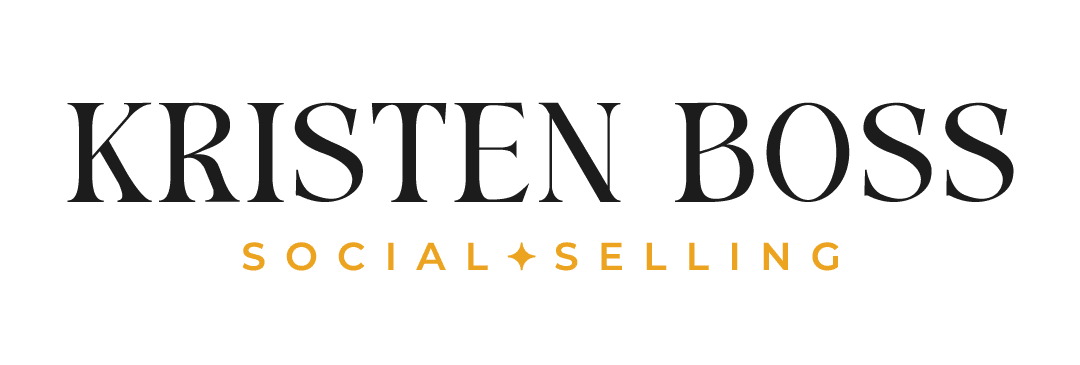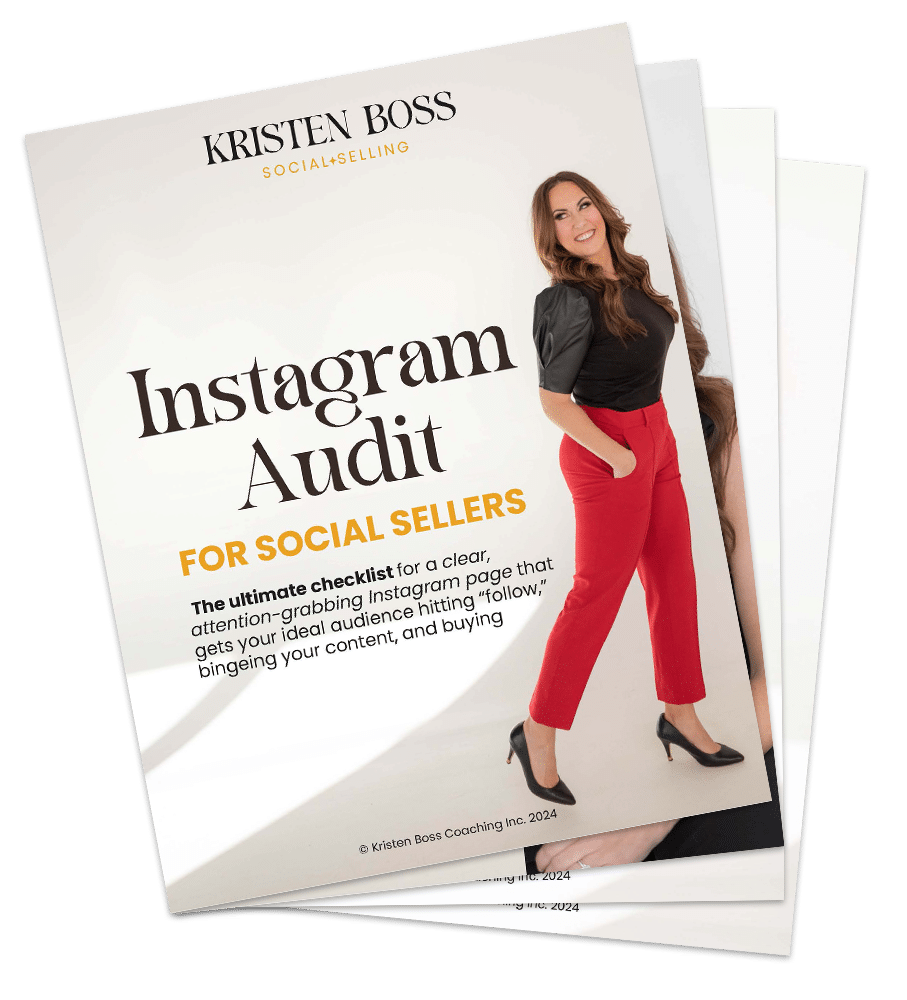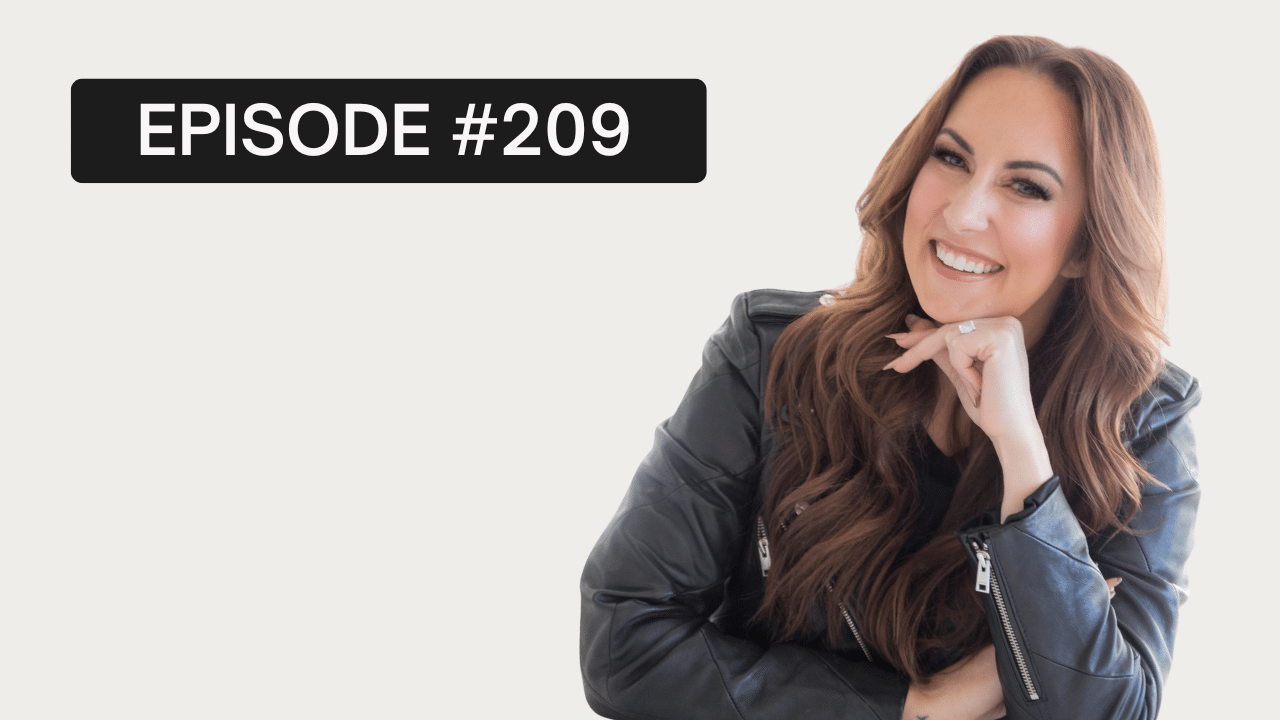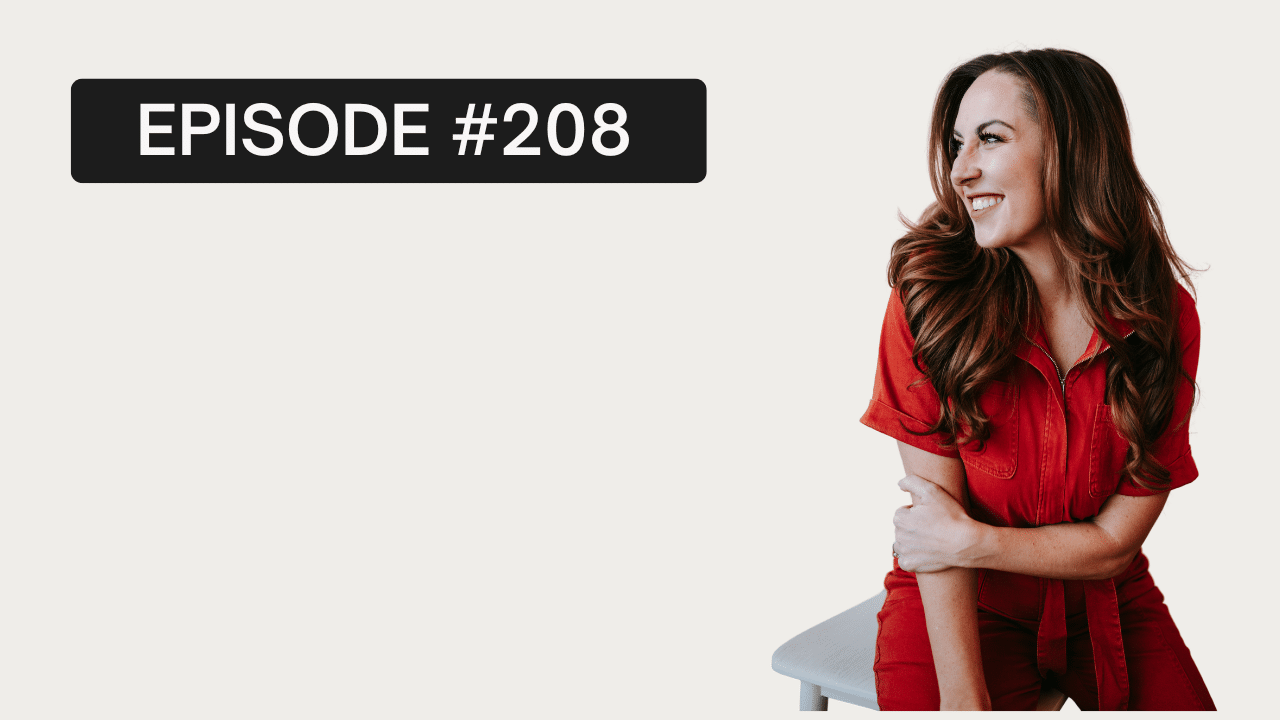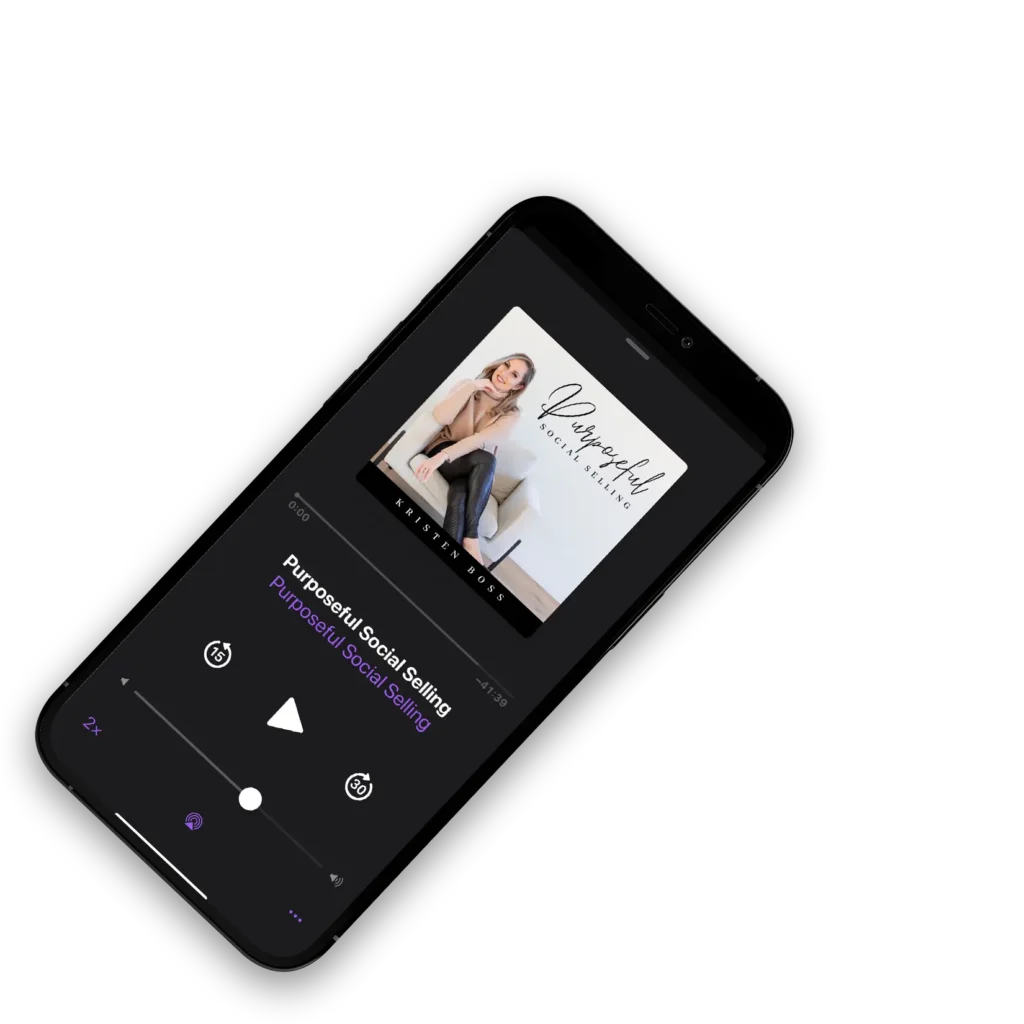How many times have you been pumped up to make changes in your life only to be disappointed when you quit a few days or weeks into your new habits? No amount of cute workout clothes or pretty planners is going to get you through the resistance and old programming that your brain offers you. Kristen’s giving you exactly how you need to approach your personal development and habit goals instead.
Here are a few highlights:
- Why we always have resistance to new habits at first
- What it means to live in the ‘both, and’ world in the first 90 days of your new habit plan
- The 2 questions you need to answer before you start a new habit
- Why deciding between being outcome or process-focused is the key to sustainable success
- The different phases of building new habits
We all have human brains, which means that we’ve all been stalled with resistance while trying to form new habits. To create discipline and develop long-term habits, we must learn how to plan for and manage our brain’s stories when they inevitably crop up. Listen in to approach things differently.
Discover the power of reaching your ideal audience effortlessly with The Audience Accelerator‘ a game-changing 30-Day content strategy plan that will revolutionize your online presence through targeted marketing strategies and expert guidance.
Introducing the Social Selling Leadership School: A 12-week Advanced Leadership Certification program for Network Marketers. This program was designed to give you everything you need to be a confident and transformational coach for the people you serve and help your team get massive results. This is the ONLY Coaching Certification program built specifically for the social selling market. Find out more and join the waitlist here!.
Thanks for listening! Do you have a question about network marketing? Kristen can help! Drop your question here, and she just might answer it live on the podcast: https:/Kristenboss.com/question
Connect with Kristen:
If you’re ready to learn the simple process of running your social selling business online, you have to check out Kristen’s live group coaching program! The Social Selling Academy: www.thesocialsellingacademy.com
Transcript for Episode #172: RE-AIR The Discipline of Habits
Kristen Boss (00:19): You are listening to the Kristen Boss podcast. I’m your host, Kristen Boss. As a best-selling author and performance coach, I’m on a mission to share about sustainable and purposeful approaches to both business and life. Each week I bring relevant topics that I believe are necessary to create a life of purpose, significance and meaning. Entrepreneurship is about so much more than growing your bottom line. It’s about who you are becoming in the process and building a life that is truly extraordinary. Entrepreneurship is really just the beginning.
Kristen Boss (00:57): Hey, bosses. Welcome to another episode of the podcast. This week I’ve got an interesting topic for you. I want to teach you and talk to you about a particular mindset when it comes to building and creating new and sustainable habits in your business. Whether you are brand new to starting a business or you’ve been doing it a long time, there are habits that you must have in order to build a business that works in the long run, a business that doesn’t burn you out, a business that you enjoy showing up to, and it starts with the habits you have surrounding your business. So I want to talk about that because a lot of times when people think of creating habits, I noticed how often perfectionism creeps into their concept of forming a habit. We all can have these very lofty ideas when we sit down to create new habits in our lives.
Kristen Boss (01:51): So whether it is posting on social media five days a week or showing up differently on our platforms, whatever habit you are trying to create, even if it’s trying to drink more water daily, moving a daily movement goal or a nutritional goal, any area in our life where we want to have self-improvement, we are going to be dealing with creating new habits and it’s just not new habits. A lot of people get very caught up in behavior modification where they’re looking at the actions they want to change, but they don’t understand the stories that fuel their actions. They don’t understand the stories that they tell themselves that create their behaviors. Again, because when you’re telling yourself the story, none of this works. This doesn’t matter. This is very frustrating. The behavior that’s going to follow that story is likely going to be a behavior where you’re negotiating with your yourself.
Kristen Boss (02:44): You’re not taking yourself seriously. You’re not making time for your habit. You stop showing up for your habit, like your stories always inform your behaviors. And when people talk about creating habits, creating sustainable habits is they often focus so much on behavior modification that they’re not looking at the beliefs and stories that fuel the behaviors. And often it’s the frame of mind that people have when they’re going into setting a goal or starting new habits. So I’m going to give you an example. A lot of students inside my academy, we had a ton, like hundreds of new students join, and they are, a lot of them are starting their first goal getter challenge. And a lot of times when we’re setting a goal, it takes roughly 90 days for your brain to interpret a habit as your way of life for there to be a lot less resistance and for it to become a part of who you are more than what you do.
Kristen Boss (03:35): When you first step out to do a habit, it can feel like you have a lot of resistance. It feels extremely tedious. You’re going to notice a lot of resistance in the beginning because you’re trying to break old habits. And old habits have been there for a long time. Old habits do die hard. And so I noticed that people get surprised when they find that their old habits aren’t just gone the moment they have an intention to create new habits. I would say in the first 90 days of creating a new habit, you’re going to l be living in the tension of the both and world. You’re going to be dealing with all of your brain’s memory of your old habits, your old way of doing things while you are trying to create new neural pathways and new habits. So you’re going to feel like you’re in constant tension.
Kristen Boss (04:27): It’s supposed to feel that way. But I think a lot of times when people set out to start a new goal, start a new habit, they go in with it with I would say optimism and perfectionism. They have this idea of like, okay, I’m going to wake up every morning, 5:00 AM going to, and I’m going to get to the gym. Let’s just say that’s the habit. You want you to be a morning person, you want to be at the gym or up at 5:30 AM every day, but you have not been the person that’s been waking up at 5:30 AM every day. In fact, you’ve been the person that when the alarm goes off around seven, maybe seven 15, maybe seven 30, you just kind of wake up when it’s time to wake up. Now, some of you might be laughing at me being like, Kristen, I’m a mom.
Kristen Boss (05:09): What do you mean wake up when I want to wake up, my kids wake me up. No, my chores, my life wakes me up. But you may not anytime you are trying to create a brand new habit. So if your body and your brain is not used to you waking up at 5:00 AM 5:00 AM you can expect a lot of resistance to that because again, your brain is always trying to keep the status quo. It does not change because with change means we’re going to be uncomfortable. It’s not going to be fun. And your brain’s like, I don’t like change. So how can we keep the status quo? How can we stay comfortable here? So when people set up goals or they set up creating new habits, I think a lot of times they come to it with a lot of optimistic enthusiasm like, oh, I’m going to do this.
Kristen Boss (05:52): I’m going to do this. They go out and buy a new planner when there’s 10 already stashed away in their closet somewhere with chicken scratch, and they’re like, okay, new planner, new pens, new water bottle. I’m ready to do this. How many of you do that where you’re like, I’m just going to go to Target and buy new things to motivate me. I’m going to go buy cute new workout outfit. So I’m excited to work out, and I’m not saying there’s anything wrong with that, but sometimes we put so much emphasis on preparing and less emphasis on the execution. We get all of our dopamine hits from the preparation of the habit. So for example, I’m going to set out my clothes and I’m going to write down my intentions. I’m going to buy a new notebook. I’m going to buy fancy new pens, and I’m going to get a new water bottle.
Kristen Boss (06:41): And what kind of fun equipment? And again, there’s nothing wrong with that, but a lot of times people get all of their dopamine hits from that. But then when it comes to waking up the next morning at 5:00 AM when the alarm’s going off and your body is physically screaming, I do not want to do this. It feels very different. That brand new notebook and those glittery pens aren’t going to be there to save you when your brain is offering all kinds of resistance first thing in the morning. But here’s what I notice is you might set out well and start well, but a lot of people tend to bring in too much performative perfectionism when they’re thinking about creating a new habit and they don’t anticipate, again, because old habits die hard. They don’t anticipate how hard their brain and their body is going to fight to keep the status quo.
Kristen Boss (07:30): And when you are planning for goals, when you’re planning for new habits, you need to think about how you are going to handle adversity. You can’t just sit there and say, here’s my plan and here’s what we’re going to do. You need to actually go a step beyond that and think, okay, well what is my plan going to be when it all falls apart? What is my plan going to be when I get sick? What is my plan going to be when a spouse gets sick or my kids get sick or my schedule isn’t interrupted or my boss calls me? What’s going to be the story? What is that plan then? And then not only, okay, so how am I going to handle obstacles, but lastly, how am I going to handle failure? It is inevitable. I’m going to fail in some capacity as I’m forming this habit.
Kristen Boss (08:17): And some of you’re like, I won’t even entertain that conversation, but because you won’t have that conversation with yourself early on, when you do have a fail, it becomes catastrophic for you. Suddenly you’re like, I have to start all over. I have to start from square one. I have to go back to day one. A lot of people do this. They’ll get maybe 21 days into forming the new habit and then they’ll have a slip up and then they’re beating themselves up. I can’t believe I missed this. I can’t believe I screwed up so badly. And because they beat themselves up, then they kind of like, okay, well maybe we’ll start again tomorrow or maybe we’ll start again Monday. Or they with themselves to let themselves off the hook or what they end up doing is even worse of a narrative of telling themselves, I have to start all over.
Kristen Boss (09:04): All of this is for nothing. I knew I couldn’t do this. I’m going back to day one. And how good does it feel when you tell yourself that, when you tell yourself, I have to start over because I didn’t do it right? No, the story you’re telling yourself is because I didn’t do it perfectly, it doesn’t count. That’s what you’re telling yourself every time you quit on a habit or quit on a goal sooner than you thought it would take to get there. When you’re 30 days in and it was a 90 day goal, 90 day goal, and you fail or you slip up. If you’re telling yourself, okay, this was just a disaster, I need to start over. What you’re telling yourself is the first 30 days up to that didn’t count. It didn’t matter because it wasn’t perfect. Instead, I want you to think about the story you want to tell yourself as you’re forming the habit.
Kristen Boss (09:51): So many people, they’re more focused on the reward of the habit rather than the reward of building a habit, the reward of being somebody who builds a new habit. Let me give you an example of that. So let’s say one of your habits you want to do is you want to be at the gym and your end goal is you want to be at a healthier weight, you want to lose five pounds, you want to be healthier. Again, I don’t want to glorify standardized beauty or anything like that. I’m just talking about being healthy, that your goal is like, okay, I know for me to feel healthy, I want to lose three pounds or whatever it is. Okay? So you have that, have this goal, and part of the habits you want to create for that is, okay, I want to go to the gym every day, 5:00 AM five days a week, I’m going to work out.
Kristen Boss (10:37): I’m going to drink my water and I’m going to follow this eating plan, make sure I just get in my veggies, eat nutrient dense foods. This is my plan for me. So you create this plan. Now, there are two types of outlooks you can have with this plan. You can look at this plan and say, I am doing these things in order for me to lose the weight. What I would say that is looking at your habits as a means to an end, and instead of saying, I’m forming these habits because it matters, because this is my way of life because this is sustainable and I know a byproduct of that will be weight loss, but this is just who I am one, the habits are a means to an end. I’m only doing these things so I can get to point A or point B.
Kristen Boss (11:22): And the other one is, I’m doing these things because these are habits I want to keep. These are healthy habits, these are sustainable habits. This is who I want to be. Okay? So here’s what happens when you are somebody who decides to take on habits as a means to an end. What happens is when you have hiccup hiccups or when you aren’t seeing the results soon enough, you end up giving up on yourself again because you’re not seeing yourself getting closer to the end goal. You’re focused more on the reward than you are on the process and being focused on the process. That’s when you can actually celebrate, okay, I’m not at my goal yet, but I’m drinking my water. I’m making better choices every day. I’m more active than I have been in a really long time. I like who I’m becoming. I like this process and I like what it’s teaching me.
Kristen Boss (12:08): You have to decide are you going to be outcome oriented or process oriented? And people that are process oriented are oftentimes more faithful to the process of building habits and creating sustainable habits that last for a lifetime as opposed to, and I’m going to say being only outcome oriented is a little hustling. That’s when we’re only doing the behavior to get to a goal. And oftentimes when we are trying only being outcome oriented, we want to rush the process or we compromise things in the process. Let’s look at diet culture. If you’re in a hurry to lose the weight and instead of like, okay, I’m just going to build these lifelong habits, and I know the byproduct of these lifelong habits over time is being at a healthy weight is having better cholesterol levels, my blood sugar being under control, I know that the byproduct of me living this way, this being a part of who I am, this having sustainable habits, I know I’m going to have these byproducts.
Kristen Boss (13:09): That person is going to show up differently than the person who’s like, I got to get in this size dress by this day and this time. And suddenly now we’ve put a timeline on it and suddenly the process becomes, it’s less about the process and more about the end result. And that’s when people will do juice fast and incredibly calorie, what? What’s the word I’m looking for? Where they’re cutting their calories extremely crazy where their calorie restriction, wow, why was that so hard for me to find the word for that guys? So they do extreme caloric deficits and calorie restrictions. They’re cutting out food groups, they’re exercising more than they should, but here’s the thing, they’re cutting out a lot of all kinds of things, dairy, gluten, sugar, all guys. And I used to be the elimination queen, and it was always because I was hustling for an outcome instead of learning to have a healthy and sustainable relationship with myself and my body and my nutrition.
Kristen Boss (14:10): Very different mindsets. So when you are focusing on the actions or the behavior, again, we’re kind of going to bring it back to the behavior more than about the sustainable habits. Here’s the thing is, yeah, you might get to the outcome, you might get to the result you want, but were all of those habits that got you there? Is that the way you can see yourself living for the next three to five to 10 years? Is it sustainable or did you hustle in order to get a quick result? And then once you got the result, now the problem is you don’t know how to have sustainable habits to keep the result. This is why a lot of people will lose and gain the same 10 pounds is because they’re not doing it sustainably. And I know, and it’s the same for business guys, it’s the same.
Kristen Boss (14:57): Some people are like, unless it happens fast, it’s not worth it to me. Instead of I’m willing to build lifetime skills, sustainable habits, and then necessary disciplines. I know that if I’m committed to the process, the byproducts will be these results in my business. And oftentimes when people are more behavior modification, that is when they’re burning themselves out, they’ll do extreme things and then they burn out. They’re tired, they feel they need to take a break from their business, and then they recover for a little bit, and then they come back to their business and they’re stressed out because now their paycheck is suffering because they took a break for a while and now they feel they have to hustle again. Do you see how the cycle perpetuates itself? So when it comes to setting a goal, I really want you and just building habits, I want you to think about are you building habits only with an end goal in mind or are you building habits?
Kristen Boss (15:51): Thinking about how the process itself is changing you about why the process work works for you and why it matters that you stay committed to the process and then you trust that the end result will come. A lot of times I see people, this is a great example. Again, I’ll use my 90 day goal getter challenge inside the academy. What I tell people in the first 90 days, because I tell them, I’m like, this isn’t just a 90 day thing that you do once and you never do it again. No, you’re actually, it’s a 90 day lesson for you to build a new neural pathways in your brain for you to build new habits, for you to build discipline. Because most people think they’re consistent in their business and they’re not. And I always tell people, I’m like the 90 day goal getter challenge is going to open up your eyes to all the things that you haven’t seen before in your business.
Kristen Boss (16:43): It’s going to be woke at the end of it. It’s going to be a little, and it’s going to be very frustrating because you are going to see all the areas you’ve been compromising that you didn’t know before that. So what I tell people is like, okay, the first round 90 days is actually not about the outcomes. Yes, you are going to see an increase, you’re going to see an increase in engagement, followers, customers, you are going to see those things. But what I tell them is the first 90 days is not so much about the outcome, but way more about learning what it takes to commit fully to a process and what consistency actually looks like in their business. And I tell them like, you’re going to learn a lot about yourself and you’re going to build muscle memory in your business. You’re going to learn what it feels like to overcome hard days to overcome resistance.
Kristen Boss (17:36): All of your stories are going to come up, all the stories you didn’t know you had in your business, you’re going to find them. So your first 90 days is actually building the muscle memory and building the habits that create the habits that the create the results of the bigger paychecks down the road. Everyone wants the big paycheck, but very few people want to learn the habits and instill the discipline and have the necessary skills in order to have those things in order to grow the paycheck. Everyone wants the reward, but very few people are willing to commit to the process. And the first 90 days, I tell people, I’m like, you’re going to learn what it takes to commit to a process. You’re going to be building new habits. You’re going to actually figure out what it looks like to show up sustainably and consistently in your business, and it’s going to shock you.
Kristen Boss (18:21): And then what happens is because if you’ve listened to this podcast long enough, if you followed me long enough, I talk about how consistency compounds over time. So the first 90 days is like you have to learn what consistency actually looks like. You have to actually be someone who’s consistent. So that is phase one. Phase one is like, okay, what does it actually mean to be consistent? What does it mean to have that muscle memory? What does it mean to build these habits sustainably? What does it mean to overcome stories when it feels like things aren’t happening fast enough? Again, the only reason why people get discouraged with building habits is because they’re more focused on the end result than they are on the habit itself and seeing the value of the habit. Do you understand? Are you following me? Where it’s like, are you someone who is valuing the outcome more than the habit itself?
Kristen Boss (19:09): And so when you’re not seeing the outcome fast enough, you give up on the habit. You give up on the process. And I know this because that’s when people give up. They look at the process and they’re like, it’s slow. It’s frustrating. I’m like, yeah, that’s how it feels at the beginning. Have you ever seen the movies with the steam engine trains and how much energy a train has to build up in order for it to gain momentum? I mean, just think about the law of physics getting started. It takes a lot of energy to start something. Think about how much energy a plane has to exert in order to get off and into the air. You have to exert a lot of energy. It takes a lot of consistency to reach momentum. And the only reason why a lot of people never see momentum is because they’re never consistent long enough for the consistency to compound.
Kristen Boss (20:01): And what’s fun is the goal getters. Students inside the academy, when they do phase one their first round, they’re like, man, I learned a lot about myself. I actually learned what it looks like to be consistent in my business. I did all these things. And do you know where they start seeing the crazy compounded results round two and round three? It was so fun. Someone in the academy just shared that her first round, she had to learn, okay, these are all the habits I had to learn. I didn’t realize I was doing this. I had told myself for years I was working on my business. I was busy scrolling and doing all kinds of other things. So my first 90 days was actually learning what it felt like and what it looked like to be serious and committed to my business for 90 days. And then she said, and then round two, I started seeing some results, and I just kept trusting.
Kristen Boss (20:47): Come round three in nine months, she finally hit a rank that she was working three years toward all the effort. She said, it took me three years. I was stuck, stuck, stuck. And then finally, when I did the goal getter challenge, I got there in nine months, nine months versus three years because she finally figured out, okay, this is what it looks like to be consistent. I can be committed to the process and trust that the results are coming. And that is exactly what happened. She’s like, I was the highest recruiter, reached the highest sales, and I earned the trip, and I got the rank, and it was so fun. We loved celebrating her. It was amazing. But it was because she didn’t have that goal. Her first 90 days. Her first 90 days was like, I’m going to figure out what it takes to be consistent in this business.
Kristen Boss (21:35): It is no different. Even if you never join the academy, you need to be thinking this way. When it comes to goals and habits, what if your first 90 days of starting a habit is not about the reward or the outcome at all, and it’s just about building muscle, muscle memory, building self-trust, learning your stories and figuring out, okay, this is what it feels like, and this is what it looks like to be somebody who builds habits. Most people build habits with an outcome in mind, and if the outcome doesn’t happen fast enough, they give up on the habit. And the habit never truly sinks in and becomes a permanent habit. Doesn’t become an identity. It doesn’t it we think about things when we think about the outcomes we want. A lot of people think like, okay, what do I have to do? They, they’re very, very fixated on behavior modification, but behavior modification only lasts so long.
Kristen Boss (22:28): What you need to change is who you are being. You need to get to the identity level. It’s not just, okay, this is not only what I do now, it’s who I am. And I remember for me in my business, just kind of bring it back full circle. I remember for me in the beginning, it did feel tedious and cumbersome. When I wrote content, I remember feeling like it was so hard. I remember thinking one post would take me 45 minutes, maybe an hour, and I remember thinking, man, this is so hard, but I’m committing to figure this out. And so for me, I’m like, okay, I’m just going to keep going. And eventually, and I remember once thinking like, okay, I need to make my posts. I need to do, I need to add people to my Facebook group. I need to do an event.
Kristen Boss (23:11): I used to remember, I had to tell myself, okay, this is how I’m going to show up. These are my action items. I still had to talk myself into it, but eventually with time inconsistency, now I don’t even think about it anymore. Now, part of my business activities, it feels like brushing my teeth. It’s just something you do. It’s just who I am. It’s like, okay, I wash my face. I brush my teeth, I walk the dogs, and these are the things I do in my business. I have very little resistance to business activities now because they have become lifelong sustainable habits at the identity level, not just like, this is what I do to get to where I want to go. No, this is just who I am and when. This is who I am in my business. I know the byproducts are always following because consistency compounds.
Kristen Boss (23:55): So this is my encouragement for you today. It’s thinking about the process of building habits differently. Instead of only building a habit with an outcome in mind, build the habit with the process in mind. Build a habit with who you are becoming in the habit building instead of only placing the value on the reward place, the value on the process. When you do this, if you place more value on the process, then you do the reward. You are going to overcome so many more hurdles in your business. You’re going to stay consistent. You’re going to stop shaming yourself when you have a bad day and you’re going to keep going. You’re going to actually realize your potential because you’re not being a jerk to yourself anymore. So be thinking about this as you’re setting up new habits and new goals in your business. Be more committed to the process than the reward. When you do that, everything will change. We’ll catch you next week. That’s a wrap for today’s episode. Listen, if you love what you heard here today, I would love for you to leave a real quick rating and a review. This helps the show get discovered by new people. Be sure to take a screenshot of today’s episode and shout us out on Instagram. We’ll shout you right back out. If you’d like to find additional resources or discover how to work with me, head to kristenboss.com.
